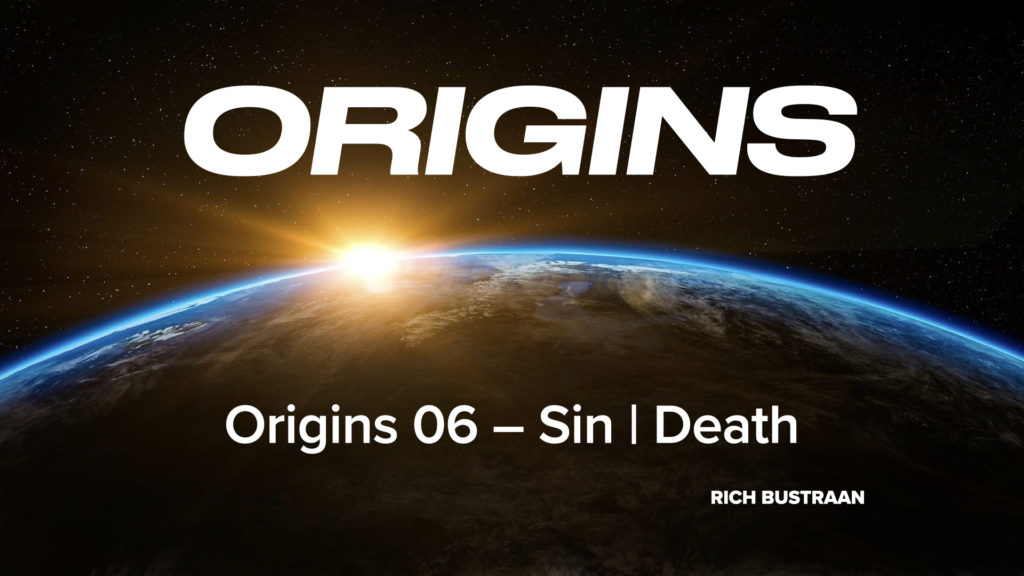Origins 06: Sin | Death
The Saddest Chapter in The Bible
As parents, we do not intentionally teach our children to do wrong, we instruct them to do what is right. Why? Because they will naturally do what is wrong. It is in their nature to err, to rebel. They inherited this nature from us. The same way that your kids are a beautiful combination of you and your spouse’s physical and psychological person, they also received from you this natural inclination to do wrong. But where did this come from?
Today, we will read Genesis 3:1-13 and understand three truths about sin: 1) The Deception of Sin 2) The Act of Sin and 3) The Consequence of Sin.
Watch on Facebook.
5:30PM | Friday | November 20, 2020
How do we know all have sinned? All die.
“When Adam sinned, sin entered the world. Adam’s sin brought death, so death spread to everyone, for everyone sinned (Romans 5:12).”
The Deception of Sin
Last week we studied the Great Serpent and saw his power to deceive. There is a phrase in Genesis 3:6 that perfectly describes what deception is.
When the woman saw that the fruit of the tree was good for food and pleasing to the eye, and also desirable for gaining wisdom …
Nothing changed expect the women’s perspective. The trees were all the same. But she saw them differently. As a deceived person, The tree of the knowledge of Good and Evil, which was not to be eaten, became just like every other tree of the garden. In Genesis 2:9, we read …
The Lord God made all kinds of trees grow out of the ground—trees that were pleasing to the eye and good for food.
Under Satan’s spell, the taboo tree, that was not to be eaten, was just like all the other trees and could be enjoyed for food. In fact, it was not taboo, it was a gateway to bringing knowledge and a threshold into another world of being like God. When things, that God says are wrong, seem harmless and we can no longer make moral assessments and value judgments, we are deceived. Beware! What happens next is your own destruction.
The Act of Sin
She took. She ate. She gave to her husband. He ate. Genesis 3:6 says,
she took some and ate it. She also gave some to her husband, who was with her, and he ate it.
Just a few words. Stop! Read them again. You could miss it. That little phrase was the step into sin for all humanity. Like Neil Armstrong said when he landed on the moon,
One small step for man. One giant leap for mankind.
Think about this. Adam and Eve were given one command. Do not eat from the tree of the Knowledge of Good and Evil. That was it. No other taboos. No other boundaries. Everything else that the Lord had made was to be enjoyed.
Adam and Eve transgressed. There are two words in English that are translated from Greek language and they capture the ideas of sin. First is to miss the mark of perfection. This word is sin. The other word is to step over the line, to do what is prohibited by God. This word is transgression. So here we read that the first man and woman transgressed. They stepped over the line and did what they were not to do.
The Result of Sin
1. Aware of Sin. They Died
Their eyes were opened. It is interesting that the text says, “at that moment.” This was to fulfill the consequences that God had spoken about the moment anyone would eat the fruit of this tree (Genesis 2:17) …
The moment you eat from it. You will die.
At that moment, they died. This means that physical death came as a result of eating from this tree. Paul says in Romans 5:12
When Adam sinned, sin entered the world. Adam’s sin brought death, so death spread to everyone, for everyone sinned.
Their physical death would come many years later, as Adam lived be 950 years old, before he passed away. But their spiritual death began immediately. With the crossing into this threshold of sin, the opening of eyes to understand what it means to be a sinner, they also died spiritually. Paul says (Ephesians 2:1,4,5),
you were dead in your transgressions and sins … But because of his great love for us, God, who is rich in mercy, made us alive with Christ even when we were dead in transgressions
It is thought that since death and decay are already at work within the body of all people, that this is also the source of disease and disabilities. Malfunctions, mutations, genetically inherited conditions and all other physical weaknesses come from death already working in our bodies. You might even say that this is where our psychological illnesses arise from. Death is already at work within us. Read 2 Corinthians 4:16.
2. Shame
Up to this point in time, the man and women were walking around without clothing. However, they were unaware of their nakedness. Now that they had sinned, they became aware that they were unclothed and immediately tried to cover their nakedness.
Shame is different from guilt. Guilt is the understanding of doing wrong. It is a thought and a feeling. Shame is the sense of what others will think. Shame is as powerful as guilt. The symbolism in their nakedness and desire for clothes is worth a thousand words.
They not only made clothing, but they hid from the Lord. Why do we hide our evil? Why does the adulterer have a “secret love affair.” Why does the thief avoid capture? Why does the embezzler cover his actions? Why is CC TV used to capture people in the act? Why are private detectives hired to investigate? The answer is easy. We hide our evil. The act of covering evil is evidence that we know our evil is evil. It is not only an attempt to cover guilt, but to cover what is perhaps even more powerful than guilt, shame. The thought of our evil actions bringing humiliation and changing our reputation among our peers, will make us go to great extents to keep our evil actions under cover.
3. Broken Relationship
I believe that one of the most tear jerking comments made in the Bible is the question that the Lord asks in Genesis 3:9, “Where are you?”
In this one comment is the broken heart of our God. The regret of an irreversible decision now settling in. The perfect trust in a perfect relationship, now broken. The realization that walking together in perfect friendship would never again be the same.
The Lord knew where they were. It is not a question of hide and seek and God’s limited knowledge. It is rhetorical. The question is meant to draw out the man and the woman into a conversation. He knew they were hiding and he knew why.
4. Blame
“It’s not my fault.” Adam said,
The woman you put here with me—she gave me some fruit from the tree, and I ate it.
All addiction programs teach that the first step to overcome your addiction is to admit that you have a problem. You drink because you have a drinking problem. You missed work, because you have a drinking problem. You were almost violent with your wife because you have a drinking problem. These are not the causes of your drinking problem. They are the consequences.
When the Lord asked Adam if he ate from the tree of the Knowledge of Good and Evil, his answer should have been, “Yes.” But, instead, he blamed his wife. In fact, if you read a little closer, it is obvious that Adam is blaming God. “The woman you gave me …” Adam retorted.
Isn’t interesting how true this story is. We read it and we all agree that blame is part of the result of sin. We have excuses for what we do. In fact, many of us blame the Lord too. We like to shift blame, cast blame, avoid blame. But, the Lord was not deterred by Adam’s blame.
It was not only the man, but the woman also blamed someone, the Serpent. She blamed Satan. She said, “The serpent deceived me, and I ate” (Genesis 3:13). Her words are more truthful than the man’s. Remember, this is the first time that deception had taken place. You know how it is when you have fully trusted someone and they betray that trust. At first, you are in shock and denial that you have been betrayed. When you wake up to the fact, you feel a range of feelings. You feel stupid. You feel angry. You feel that you will never trust again. You feel robbed. You feel violated. You become aware of the depth of the evil of this person who would play you for a fool and would be so unconcerned about your life and the destructive outcome.
Eve must have been feeling all these emotions and the way that she points to the truth of what happened is evidence that she was rather angry at the snake.
However, being deceived is not an excuse. Being deceived was not an acquittal. Being deceived did not get her off the hook. She sinned. She ate the fruit. She should not have disobeyed the one command. She was held responsible for her actions. She sinned, and through her sin, she brought sin and death into the world.
Conclusion
This is not the end of Genesis 3. To keep the studies focused, I have taken this week to address what is the most tragic chapter in the Bible. It explains where sin and evil comes from. We see the origins of sickness, disease, mental illnesses. We see the origins of sin and death.
Praise God! This is not the end of the story. Next week, we will see that God immediately introduces the plan to bring a person into the world and save the world from sin.
Blessings,
Rich




